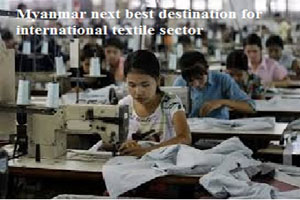
Myanmar next best destination for international textile sector
YarnsandFibers News Bureau 2015-04-29 16:00:00 – MyanmarLow wages, plentiful labour and an image problem in neighbouring Bangladesh have all boosted Myanmar’s chances. The international textile sector has discovered Myanmar as next best destination as there are currently 200,000 workers in more than 300 factories. Neighbouring Bangladesh has around 4,000 textile factories.
Khine Khine Nwe, the secretary of the Myanmar Garment Makers Association (MGMA), said that one new factory opened every week in 2014. In 10 years they want to have 3,000 factories. The aim is to increase exports from the current US$1 billion a year 10 times over and to provide a million jobs. And investors are answering the call. Chinese, Taiwanese and South Korean companies are flooding into the country.
Aye Aye Han boss of Shweyi Zabe textile plant on the outskirts of Yangon complains that the competition is luring her workers away by offering a couple of dollars more. The country is benefiting from the waning star of neighbouring Bangladesh, where the collapse of the Rana Plaza textile factory with more than 1,000 fatalities two years ago drew attention to poor working conditions in garment factories.
The timing is also good in the politics of Myanmar, which is opening up after decades under a closed military dictatorship. There is a sense of opportunity since a nominally civilian government came to power in 2011. Garment makers in Myanmar are evidently in the starting blocks, said Thomas Ballweg of a German fashion association.
He notes that factories have apparently been well built, with only one or two floors - unlike Rana Plaza with its eight floors. The workrooms are clean and the supervisors open to ideas. He sees real potential.
Christian Maag, who heads the German underwear company ESGE, with plants in Romania, Bulgaria, Greece and India, is helping Shweyi Zabeto modernize production in Myanmar. ESGE has provided software for production planning and assisted with computer programmes to help cutting to reduce fabric waste.
But there is a long way to go. Estimates put Myanmar productivity at half that of China, where production rates are high, but so are wages. According to the Verisk Maplecroft consultancy, labour costs are lower in Myanmar than anywhere else in the world. Clothing companies like Gap, H&M and Adidas are already producing here.
It’s a kind of development aid, but with a business motivation, Maag said. If things go well, they will place orders. A trial run has proved reasonably successful, with scope for expansion, and Maag is convinced that the textile sector has a future here.
Smart Myanmar, an EU project, is helping to build up a sustainable textile industry in Myanmar with the aim of secure jobs and good working conditions, along with conserving energy, recycling waste and cutting water consumption.
The head of the project is Simone Lehmann of Sequa, an organisation of German industrial associations with the German GIZ development aid agency. Their focus is on small and medium-sized enterprises. They are supporting 16 of the 80 factories with local management.
Lars Droemer, sustainability manager at Swedish fashion company Lindex, is also optimistic on Myanmar. Praising the code of conduct agreed by the textile sector, which bans employing children younger than 15, guarantees a minimum wage, restricts working hours to a maximum of 60 hours a week and allows trade unions.
They are interested in Myanmar, because they were able to help set up the standards from the start. Lindex operates according to the principal "People - Planet - Profit," in that order.
Promoting local industry is part of the sustainability drive. Foreign companies take down their factories (and relocate) when operations become cheaper somewhere else, but local employers do not, Droemer said.
The smaller Myanmar companies have yet to master the full production chain. At present they sew and package, but the big clients want a complete service, from supplying fabric and thread to dealing with customs and loading for shipment.
According to Aye Aye Han, the MGMA is working in this direction. They need textile weaving plants in Myanmar, and their companies need financing, duty-free imports of goods for re-export and they need more trained seamstresses.
Myanmar is today where Bangladesh was 10 years ago, but things have developed three times more quickly today.
Market Intelligence
Ask for free sample Report

experience
Customer Base
dedicated team
Countries Served Worldwide









